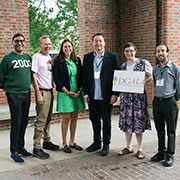Maximize Your Philanthropy with a Dartmouth Donor Advised Fund
Take a few moments to compare donor advised funds against family foundations

Oct 17, 2024
Susan Hanifin, Executive Director, Dartmouth Gift Planning Office
If you’re thinking about establishing a family foundation to conduct your long-term philanthropic giving, you should also consider an increasingly popular alternative—a donor advised fund.
Family foundations are indeed an effective means to distribute charitable gifts, but they come with some burdensome requirements and costs. A donor advised fund, on the other hand, provides a flexible means to support charitable organizations without the legal and financial hassles of a foundation.
Let’s compare a Dartmouth Donor Advised Fund versus a family foundation to highlight the differences.
A Dartmouth Donor Advised Fund (DDAF) is ideal for those who plan to choose Dartmouth as a primary beneficiary of their philanthropic giving. DDAFs are easy to set up—we call it “100 percent simple”—and provide a convenient way to support Dartmouth and other charities of your choice from a single fund.
There’s a lot to like about a DDAF:
- You are immediately eligible for an income tax deduction based on the fair market value of your gift
- Growth of your fund is not subject to capital gains taxes
- Your fund is invested in the Total Return Pool of Dartmouth’s endowment which has averaged a return of nearly 11 percent annually over the past decade
- You will never be charged a financial advisor fee, netting you more money to give to your favorite charities
- Unlike a family foundation, you won’t be required to issue an annual tax filing report or disclose gifts and contributions
DDAFs are a family tradition, too
A few years ago, Daphne and John Cunningham P’17 approached our office. They were seeking a way to support the Dartmouth men’s heavyweight rowing team in honor of their son, Nevin Cunningham ’17, and his Dartmouth experience.
Our team walked them through the benefits of a DDAF, and Daphne and John decided to establish a fund. Daphne summarizes their decision this way: “The DDAF was a good solution, because it was easy to set up and it offered the option of giving up to half of the annual distribution to nonprofit organizations other than Dartmouth, which we haven’t exercised but like knowing it is possible. I was able to work with the rowing coach to inquire about his needs and then make that happen with the annual payout generated by the fund.”
The Cunninghams’ DDAF also created a teaching opportunity, as the fund’s management has now passed to the next generation. “Just this year, Nevin took over responsibility for managing the fund and its annual allocations. This was the intention from the beginning,” says Daphne. “I am no longer responsible for managing the fund, and Nevin has a wonderful way to stay in touch with the coach and the team.”
A few simple requirements
While DDAFs offer a streamlined way to manage your funds, there are several requirements to keep in mind.
The initial amount to create a DDAF is $250,000. You can roll an established donor advised fund from another institution into your DDAF to meet this threshold.
You are required to distribute a minimum of 5% of your total fund each year. Many alumni, parents, and friends allocate 100% of their annual distribution in support of their personal Dartmouth priorities; however, up to 50% of your fund is available for outside charitable distributions.
Over the life of the fund, 50% of the fund must be allocated to Dartmouth, leaving the other half available for other philanthropic priorities.
Download our DDAF v. Family Foundation Guide
To learn more about whether a Dartmouth Donor Advised Fund is right for you, please fill out the form below to receive a copy of our DDAF vs. Family Foundation guide. You'll receive an at-a-glance comparison between the two planning instruments to help you determine which option works best for you.
Please note: Dartmouth’s Gift Planning Office does not provide tax or legal advice. Please consult your attorney or tax advisor prior to entering into any gift planning arrangement.







